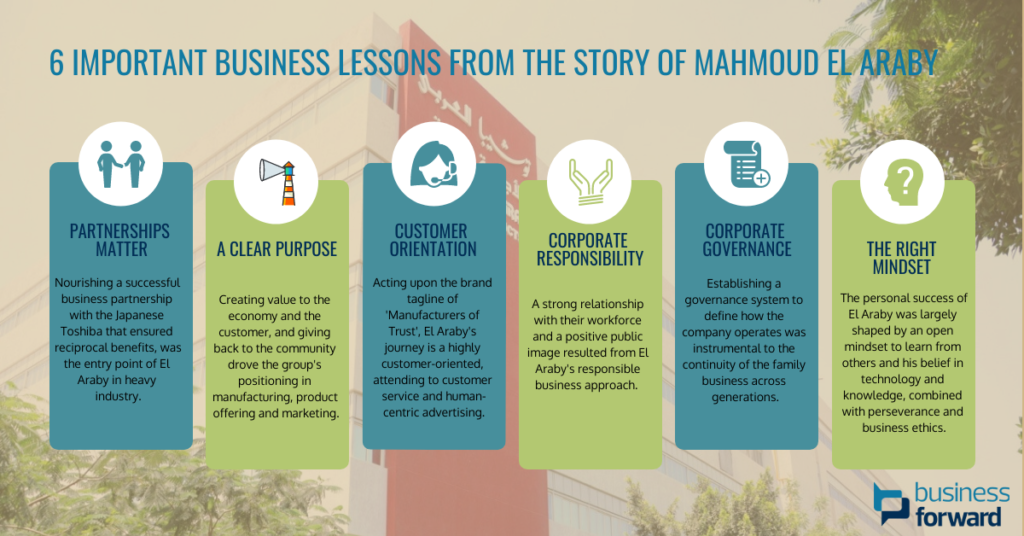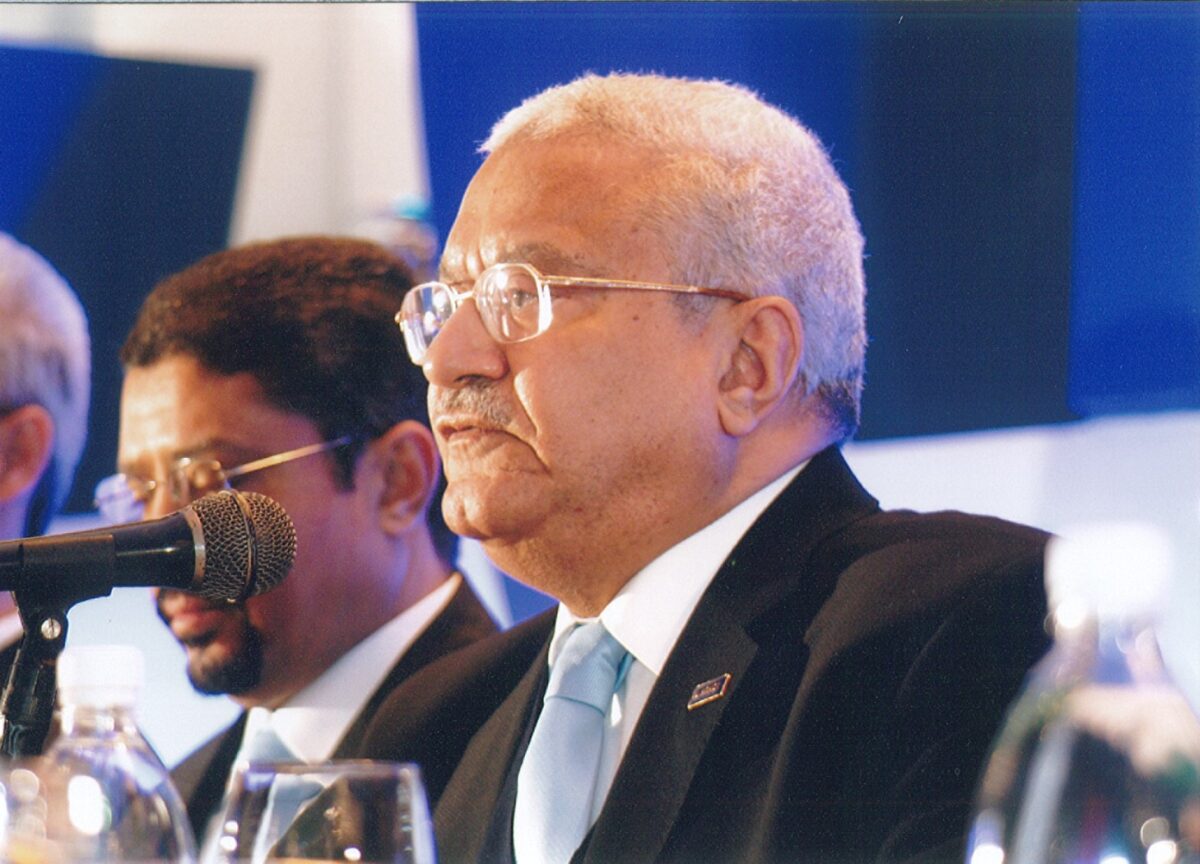How a rural young man looking for a job in the shops of the big city became an icon of Egyptian industry and commerce is one very compelling story.
Mahmoud El Araby, the prominent Egyptian businessman – or ‘chief merchant’ as he was commonly described- founder, and chairman of El Araby Group, passed away on September 9, 2021, at the age of 89, leaving behind a legacy of a self-made joint stock family enterprise for manufacturing and marketing home appliances and engineering products. Employing 40,000 people, the group’s 2020 turnover grossed EGP 20 billion, at a total market share of 38 percent.

Mehdat El Araby, earned a Bachelor of Science degree from the American University in Cairo (AUC) in 1992, and assumed different responsibilities at El Araby Group across IT, innovation, marketing and sales strategy functions, until becoming Vice President of the Group in 2019.
In an exclusive interview with Business Forward, Medhat El Araby ’92, Vice President of El Araby Group shares important business lessons about leadership, marketing, family business and corporate responsibility inspired by his late father.
Tell us what the company’s early days were like?
“The beginning of El Araby Group was very difficult, because it was a simple beginning. It started in 1964 with a small shop in El-Mosky area, amidst a busy commercial market and rigorous competition. This store’s activities expanded to include store after another, and the company’s activity expanded from stationary to imported electrical appliances. At that time, numerous challenges arose; namely political circumstances (the setback of the 1967 defeat and the October War) and a recession in the Egyptian market.”

Photo courtesy of El Araby group. The first establishment in the group: a stationary shop in El-Mosky area in the 1960s.
A turning point for the group was the partnership with Toshiba, which was apparently a huge personal effort by Mahmoud El-Araby himself. How did he convince the Japanese to invest in Egypt, bringing in their know-how and brand to a virtually unknown market?
“At the beginning of the seventies, the name El Araby had gained fame in the Egyptian market. At this time, the representative of the Japanese company Toshiba, Mr. Ando, came to study the Egyptian market to select an exclusive agent for Toshiba in Egypt. Mr. Ando got to know the late Haj Mahmoud El-Araby and observed his success in winning customers and his great talent in trade. With time, Mr. Ando’s belief in El Araby grew, and he saw the company as the best fit to serve as Toshiba’s agent locally and nominated us. After a visit to El Araby Company, Toshiba agreed with my father to grant a one-year trial.
That was in 1974. That year, El Araby Group achieved a higher sales volume than what the Japanese company requested. Toshiba saw the high potential of a partnership with El Araby, and in 1975 it decided to grant us its exclusive agency in Egypt permanently.”

Photo courtesy of EL Araby group. The first Toshiba fan produced in Egypt signed by those who attended the factory opening.
Inspired by the Japanese economy and its work ethics during his visit to Japan and Toshiba factories in 1975, Mahmoud El Araby dreamt of an Egyptian factory bringing in modern technology and creating value to the market, while employing thousands of workers and sustaining their households. “I dream of the day when Egyptians get as obsessed with manufacturing as the Japanese do,” Mahmoud El Araby once stated.
El Araby’s attempts to convince the Japanese with the factory continued for more than six years, until they were able to open their first factory in Banha in 1982, producing the iconic Toshiba-El Araby electric fans in Egypt. Today, the Banha factory produces a wide range of high-tech household and office appliances, yet still also produces electric Toshiba fans that have been an essential in Egyptian households for decades.
El Araby Group later brought in more Japanese, Italian and English brands into the market; could you tell us more about that?
“Customer satisfaction has always guided the way we do business, since the company started in 1964. The group’s slogan and brand promise is: “El Araby, the Manufacturers of Trust”. My father had always set an important goal for the group, which is gaining customers’ trust. This meant providing the latest products at the best prices, so he was always keen to bring the best international brands. It was necessary that El Araby Group meets specifications encouraging international brands to partner with us, like providing adequate stores, skilled labor, modern marketing and sales methods, as well as continuous development bringing in the latest technology.”
Mahmoud El-Araby’s funeral was attended by thousands, expressing their sadness by his departure and their admiration for him as a person. In Egypt, we saw this phenomenon for a few political figures and celebrities, but it is unprecedented for a businessman. How did his leadership approach contribute to that?
“On the personal level, Haj Mahmoud El Araby demonstrated a virtuous and amicable personality, and became a role model for hardworking youth. This is besides his public work efforts and stances for his industry during his service as the president of the Federation of Egyptian Chambers of Commerce. He also personally initiated remarkable philanthropic services and charity work to the people of his hometown and other places in need across the country.
On the corporate level, I believe that striving to build the public’s trust and solidifying a strong relationship with them in providing the best services has been key to the public perception about El Araby. The Group has made impactful contributions to the industry’s localization. Advancing the slogan “Made in Egypt” has left a great impact on the Egyptian market’s customers. Following the leadership track of Haj Mahmoud El Araby, the group is very active on the corporate social responsibility and philanthropy fronts.”
In his book ‘The Secret of My Life’, Mahmoud El Araby writes that a company with employees who do not feel loyal is a like building with no foundation. Employee loyalty does not come by lip service and empty promises, but by giving workers their full rights and benefits as the company grows. Businesses flourish when each worker feels ownership in their workplace, he described.
He stressed that “all employees are working with us in ‘El Araby Family’ [and] not working for us [as individuals].”
One of the most discussed labor market challenge (from the employer side) is finding and retaining skilled vocational workers. How do you see this? Please also tell us more about El Araby Applied Technology School, and the vision behind it.
“The most important principle in advancing any society is undoubtedly investing in human capital. For El Araby Group, the workforce is the cornerstone; it is the most important factor in overcoming any difficulties and challenges. El Araby Group started with four members. Today it employs more than 40,000 carefully selected male and female workers.
El Araby School for Applied Technology was established as a cooperation between El Araby Group, the Ministry of Education and Technical Education and the Japan International Cooperation Agency (JICA), aiming to equip youth with sharp skills and professional abilities to meet the needs of Egypt’s technical labor market.”
Family businesses make up a bulk of enterprises in Egypt. However, ensuring success and continuity from generation to the next, especially in an industry as dynamic as yours, has its challenges. What do you think were the success factors and the management model that helped El Araby Group continue as a family business?
“Indeed, a very big challenge for any family company is for the new generations to carry on without regression. Since its establishment, El Araby Group has been keen to continue its path of success without experiencing any disruption when losing anyone, regardless of their position in the company. My late father had foresight into the future. He pushed us to put in place a mandate for the family defining the group’s steps. He also paid great attention to family business corporate governance, ensuring the survival and continuity of the group generation after generation without being affected by the departure of any of its members, even he himself.”
El Araby’s advertisement campaigns are memorable and influential in Egyptian society, including ones that have a social aspect to them such as the recent Father’s Day campaign. I am interested to know about your marketing and PR strategy, especially since unlike other brands, El Araby’s many Corporate Social Responsibility campaigns are not heavily publicized.
“El Araby Group has developed a distinct strategy for itself in all its advertising campaigns. This strategy is based on values instilled by Haj Mahmoud El Araby. For example, we launched campaigns with popular jingles to promote and celebrate family ties and societal contributions such as ‘Thank you my mother’ and ‘Without you, we wouldn’t be here’. Public Relations at El Araby has always been keen to paint a mental picture of El Araby Group as a national economic entity with effective social contributions.
One of the directions set by my late father was not to announce the philanthropic contributions to a large extent, out of belief that these efforts are his national duty owed to his community and country.”
While a university degree eases entry into the labor market, in the powerful story of Mahmoud El-Araby, it is the mindset and people skills that were the important factors in his journey. What can entrepreneurs who are starting their business journey learn from his story?

Photo courtesy of EL Araby Group.
In 2009, Mahmoud El Araby was awarded the Japanese Emperor’s Medal of the Rising Sun.
“Haj Mahmoud El Araby was a unique model with a unique mentality; although he did not pursue higher education degrees, he gained literacy skills through learning the Qur’an at a young age and practically mastered the arts of trade. However, he strongly advocated knowledge as a weapon for those who want to succeed. In his book ‘The Secret of My Life’, he mentions how El Araby Group crossed vast distances in a short time by combining scientific advancement with hard work. He believed that this combination, when practiced by those with a high level of responsibility and work ethic, can achieve great results.
My father did not believe in luck, but he had a strong belief in God’s blessings, combined with an individual’s sincere efforts and insistence on achieving the goal. He believed that no matter how late the desired results are, good work does not go to waste.”










